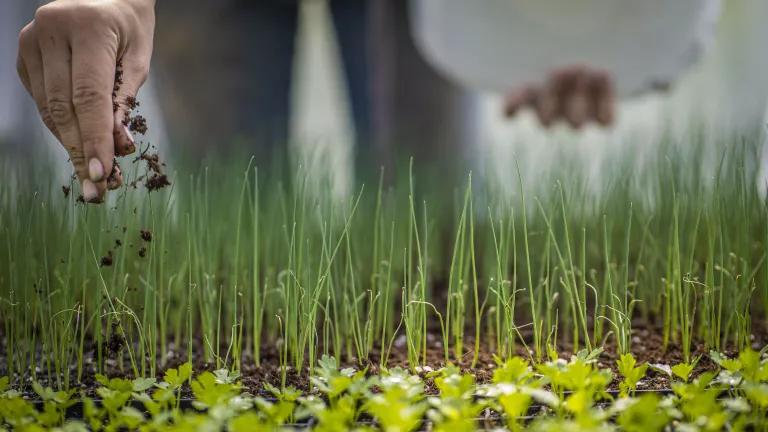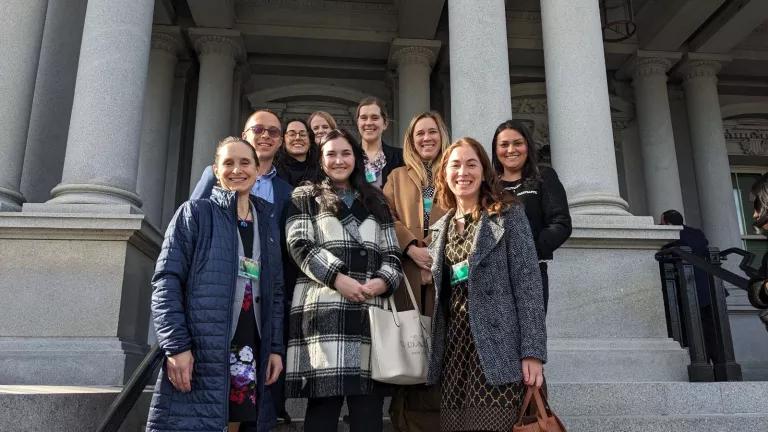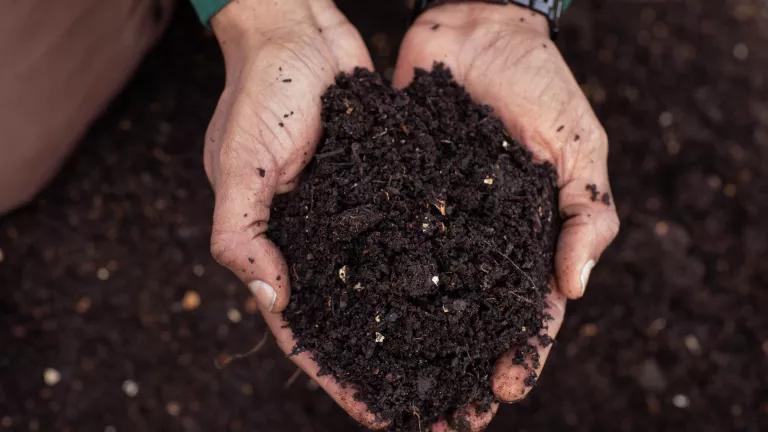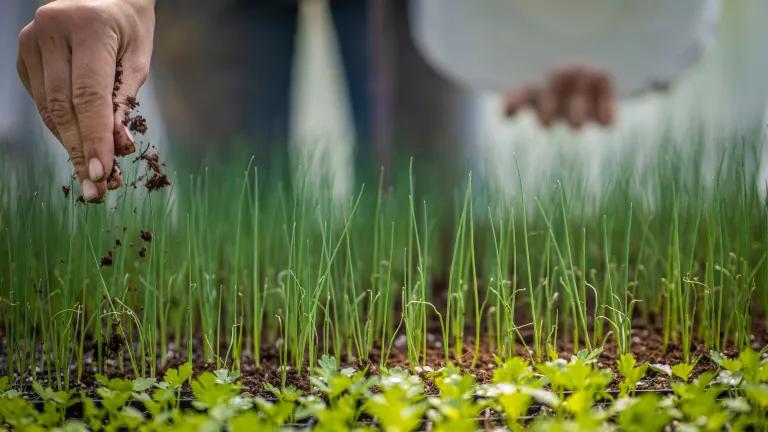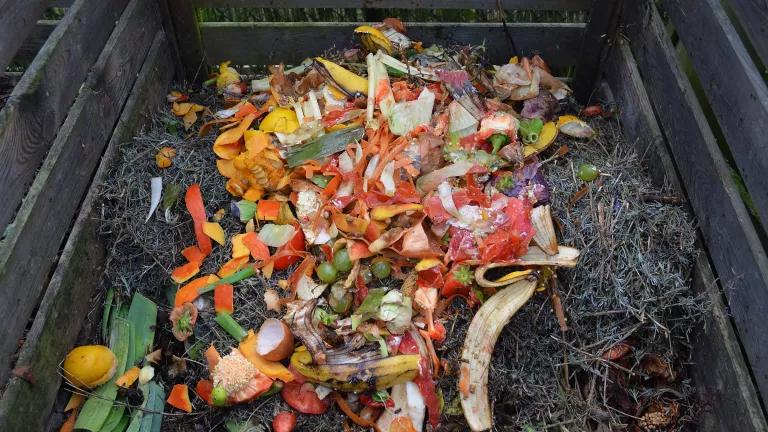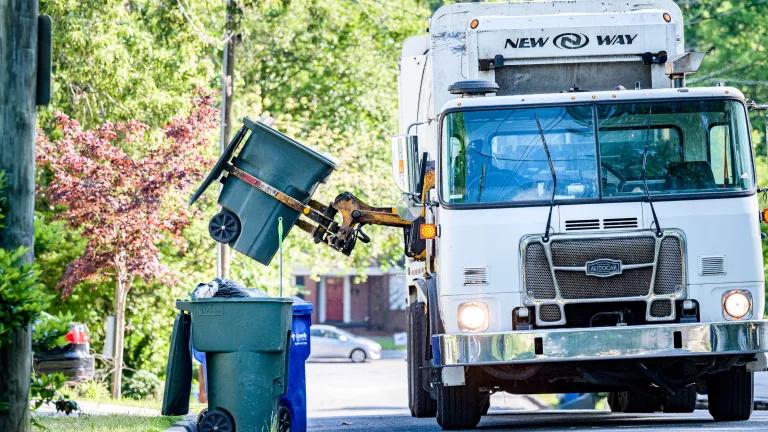Food Waste Reduction
NRDC works at the federal, state, and local levels to address the enormous challenge of food waste in the United States.

NRDC works at the federal, state, and local levels to address the enormous challenge of food waste in the United States. Up to 40 percent of food in the United States is wasted, contributing to extensive environmental, economic, and societal impacts. To achieve the United States’ goal of reducing food waste by 50 percent by 2030, we need comprehensive action across all levels of government. NRDC has been a driving force for food waste reduction since 2012, combining our strengths in research and advocacy to shift the status quo and ignite nationwide change. To address food waste systematically, our efforts include solutions across the EPA’s wasted food scale to address waste and directly focus on preventing food from going to waste, rescuing food, recycling scraps, and advancing policy solutions to do so.
How We Work
Since 2015, NRDC's Food Matters initiative has successfully reduced food waste in cities through comprehensive policy and program development. Building on our extensive involvement in cities like Baltimore, Denver, Nashville, New York City, and through our Regional Initiative and our other city partnerships, Food Matters catalyzes the creation of replicable city-based solutions, helping to standardize market-supported best practices, and spurring meaningful progress. Our knowledge-sharing network provides peer-to-peer learning opportunities for municipalities, enabling opportunities for successes in one municipality to be adapted and adopted in others across the country.
Our approach is firmly rooted in local solutions, recognizing that the most significant impacts are felt at the community level. As cities reduce wasted food, they can stabilize their waste management costs, make strides toward achieving climate and sustainability goals, and support residents in maximizing their food budgets. By preventing food from going to waste in the first place, municipalities can save money on waste collection, businesses and individuals can realize cost savings, and everyone can help avoid the numerous resource, climate, labor, and other economic and social impacts associated with producing food that goes to waste. By supporting surplus food rescue operations, municipalities can also address food gaps in local communities. And by recycling remaining food scraps through composting programs, cities can minimize landfill and incinerator emissions and build healthier soils, leading to a locally circular system.
We help advance holistic policies that address food waste at the state level. For example, we helped develop and pass New York State’s Food Donation and Food Scraps Recycling law in partnership with relevant community stakeholders. We have conducted inventories of food waste–related policies in more than a dozen states, highlighting where future action is needed to strengthen weak policies or establish new ones where none exist.
We work with Congress and through the executive branch to support federal efforts to reduce wasted food. Building on the achievements in the 2018 Farm Bill, which instituted a national food loss and waste coordinator position and grants to develop and implement municipal food waste prevention and recycling plans, NRDC and partners came together to form the Zero Food Waste Coalition, a group focused on advancing federal and state policies to reduce food waste. The coalition released the report Opportunities to Reduce Food Waste in the 2023 Farm Bill and previously issued a U.S. Food Loss & Waste Action Plan, which outlines how the federal government can take ambitious action to achieve national and international goals of reducing food loss and waste by 50 percent by 2030.
Our federal advocacy agenda is focused on the most powerful levers to address food waste: It includes efforts to standardize and clarify food date labels, a leading driver of food waste, as demonstrated in our report The Dating Game: How Confusing Food Date Labels Lead to Food Waste in America; it also promotes increased donation of surplus food, as outlined in our report Don’t Waste, Donate: Enhancing Food Donations Through Federal Policy.
In the United States, consumers are collectively responsible for more than 40 percent of all wasted food, which is more than grocery stores and restaurants combined. Changing our attitudes and behaviors at home is key to reducing food waste. NRDC’s Save the Food campaign is a major public education initiative aimed at tackling the largest driver of food waste in the country: consumer behavior. The Save the Food campaign builds awareness of the implications of household food waste and empowers consumers with tools to reduce food waste at home, thereby saving water, energy, and money.
NRDC’s reports and model policies provide support to develop and implement food waste–related policies. We codevelop model policy language that cities and states can adapt to their local needs to enable quicker policy enactment. In addition, we support the development of municipal food waste reduction commitments and the adoption of measurement and assessment tools. We also offer a toolkit for municipalities to help them establish the foundational food waste reduction policies and programs that are needed to support a cultural shift.
- State-Based Food Waste Policy Gap Analysis and Inventory Reports
- Model Ordinance on Mandatory Reporting for Large Food Waste Generators: With and Without Commentaries
- Model Compost Procurement Policy: With and Without Commentaries
- Model Executive Order on Municipal Leadership on Food Waste Reduction: With and Without Commentaries
- Liability Protections and Safe Food Donation
- Model Ordinance Establishing a Pay-As-You-Throw Program for Residential Municipal Solid Waste: With and Without Commentaries
- A Donor’s Guide to the Enhanced Federal Tax Deduction for Food Donation
- A Farmer’s Guide to the Enhanced Federal Tax Deduction for Food Donation


















